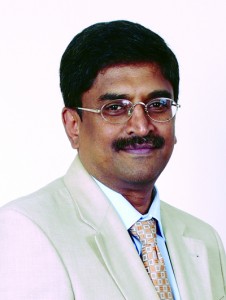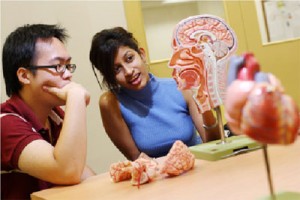A Monash Medical Program trains thinkers
View(s):The formative years of students’ minds while still in school and university are of high importance to their careers that will continue

Professor Dr Shajahan Yasin
long after graduation. But just how are systems formed to ensure that these young scholars will receive all that is necessary to guide them for the rest of their active lives?
Dr Shah Yasin is the Director of Curriculum at Monash University Sunway Campus. He joined the Medical faculty when it was first opened six years ago, fresh from his return from a posting in Australia.
His current role at Monash sees him in charge of implementing the MBBS curriculum – includingensuring that entry requirements, learning objectives, learning and teaching styles and assessments follow the Monash quality standards and policies. He also looks after the overall governance of the MBBS programme.
He explains how Monash University Sunway campus students are taught from as many angles as possible.
“We train our students to be able to work in different environments and different healthcare settings and different countries.Healthcare in countries differ due to at least two factors: the Healthcare system and disease,and illness profiles.
“All Monash University Sunway campus medical students spend time in two countries: Malaysia and in Australia. By gaining experience in two quite different clinical environments, students learn to compare and contrast. They learn to understand principles and concepts as opposed to factual knowledge. We believe that they would then be better able to work in many different environments. Currently Monash students are accredited to work in Malaysia and Australia,” Dr Shah said.
 There is much information in the medical education system, but the reality is that times are changing so unpredictably that it is hard to assess exactly what will happen and how to overcome it. Therefore, asserts Dr Shah, one of the best skills one could learn is the how to seek information independently.
There is much information in the medical education system, but the reality is that times are changing so unpredictably that it is hard to assess exactly what will happen and how to overcome it. Therefore, asserts Dr Shah, one of the best skills one could learn is the how to seek information independently.
“Knowledge, especially medical knowledge, can never last for the rest of the careers. Learning how to learn and to keep up-to-date can be critical for a lifetime of success. So we teach students to be self-learners. With the rate of change in medical knowledge, students need to continuously keep up to date throughout their life,” elaborates Dr Shah.
To develop this continuous learning skill, he explained, students need two important qualities.
“First, they need to be reflective in their learning, so that they try to understand what they know but also, critically, what they don’t know. Secondly, they need to get regular individualised feedback.”
Dr Shah says it is sometimes not so effective to receive general feedback.
“Feedback is most useful if it directly relates to you. It must point out your strengths and weaknesses and be specific. Learners, even a relatively homogenous group like medical students, are all different in their strengths and weaknesses. A reflective person would receive this feedback and draw his or her conclusion. “
The World Wide Web is definitely the choice for today that will also continue to lead how the world is run. At Monash University Sunway campus, students are taught how to use the internet to their best advantage.
“Technology is used where it is useful. Students have all their lecture notes – both the Malaysian and Australian – online. Students have plenty of resources within the school. The library has one of the largest online databases in the world and students have access to this. “
Other than keeping medical students up-to-date, it is important for the lecturers to also be refreshed on the latest in their fields.
Dr Shah says, “Keeping up-to-date is the responsibility of lecturers. There are a large number of in-house training and teaching courses available. In addition, all clinical staff areclinically active. Academic staff is also research active. The staff is encouraged to talk to students about their research as part of their teaching.
Aspirations Education is the leading representative for direct student recruitment for Malaysia. Students and Parents who are interested can call us for further information on 0774-775355 or 0115668445 or log onto our web site – www.aspirations.edu.lk. You could also visit our office at No. 267/20, Samagi Mawatha, Nawala Road, Nawala, or direct your inquiries through our e-mail – malaysia@aspirations.edu.lk
The Jeffrey Cheah School of Medicine and Health Sciences at Monash University Sunway campus trains its medical students to be independent thinkers
Professor Dr Shajahan Yasin
Follow @timesonlinelk
comments powered by Disqus


























